
NodeJS Frameworks empower and Dynamic your projects in 2024
NodeJS Frameworks and which is best Nodejs Framework? Nodejs is provides the runtime environment, that is not a framework. Nodejs is a open-source that as a server-side platform is based on Google Chrome’s V8 JavaScript Engine. In today’s business Companies, landscape and bank consider web applications as necessary. In past, Nodejs Node.js Frameworks became a progressively popular. The development process can be simple through a powerful tools, allowing for the essay developed and create a apps and website. Rapidly, a helpful structure helps build web app.
This blog focuses around enterprise and big business Hub Nodejs framework for 2024. Let us explore about the features, pros, cons and user of different NodeJS Frameworks. Each one of these technologies has its own various of frameworks. The development lifecycle assigns use cases according to a particular framework.
What are Node.js Frameworks?
Developers build frameworks for NodeJS on top of the runtime environment. Web app can be quick and productively worked with Nodejs framework, using predefined tools and libraries.
NodeJS Frameworks streamline development exercises. Software developer can focus more on the logic of NodeJS apps.
NodeJS Frameworks are classified into three types:\
- MVC frameworks
- Full-stack MVC frameworks
- REST API frameworks
MVC frameworks
A design pattern is called Model-View-Controller, or MVC. (In software engineering, a software design pattern is a generic, reusable fix for a typical issue in a specific software design environment. It is not a completed design that can be converted into machine code or source code instantly.)which is employed in the development of the frameworks that divide the logic of Node.js applications into three interrelated parts: controllers, views, and models.
Separating components allows developers to operate independently of the full programmed design, which makes maintaining and expanding Node.js applications easier.
Full-Stack MVC frameworks
Full-stack MVC gives you everything you need to make awesome web apps from start to finish. You can save time and energy by using what’s already out there to create cool and timely apps.
REST API frameworks
REST API frameworks emulate the REST architectural design to build APIs. They help keep the communication between clients and servers by making it super easy to developed web and mobile Node.js app APIs.
Top NodeJS Frameworks 2024
Now, let’s dive into some of the most popular Node.js frameworks and see which one might be the best fit for your project and development skill improve.
- Express.js
- Meteor.js
- Koa.js
- Sails.js
- Nest.js
- Socket.io
Express.js
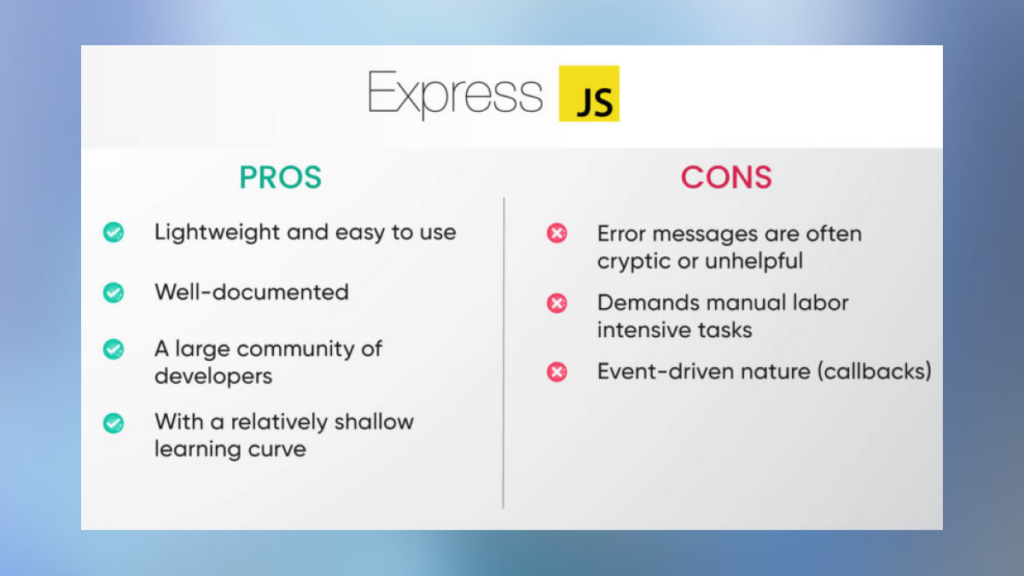
Express.js is like the bomb when it comes to Node.js frameworks. It’s super lightweight and easy to use for building web apps. Plus, it’s got a bunch of awesome dev’s in its community. How can we take advantage of its high-speed operations with its simple setup?
When you’re starting from scratch, developers don’t need a ton of skills to get things going. Express helps us handle servers and routes, and it’s great for designing web apps that use templates. It lets us create dynamic HTML pages and speeds up input-output tasks with its MVC structure. Plus, routing is a breeze with Express!
Pros of Express.js:
- Lightweight and easy to use
- Well-documented
- A large community of developers
- Creating web apps is simple and quick for developers nowadays.
- With a relatively shallow learning curve.
Cons of Express.js:
- Some other frameworks have more features compared to this one
- Error messages are typically unhelpful or challenging to decipher.
- Event-driven nature (callbacks)
Meteor.js
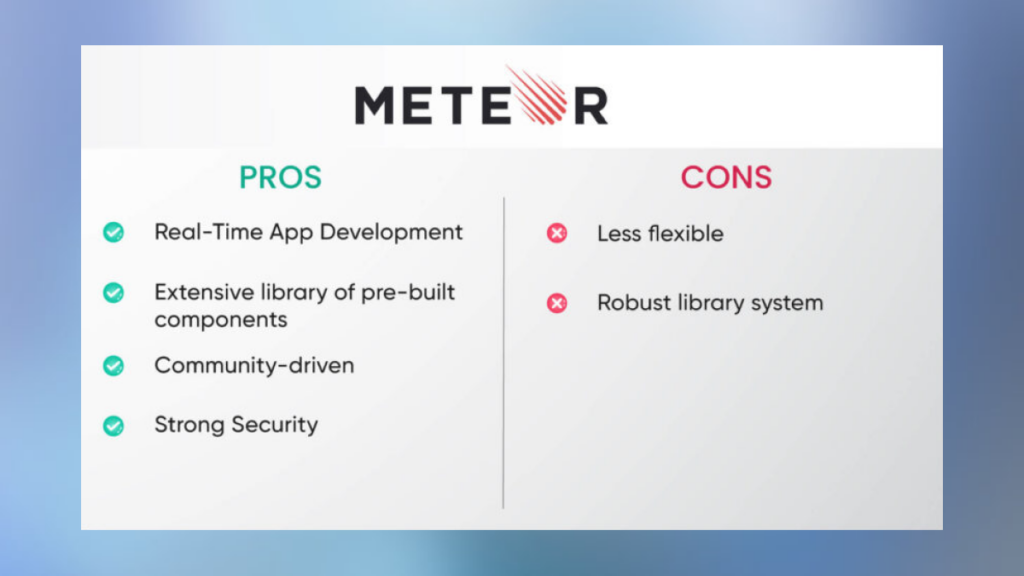
Thanks to Meteor’s awesome full-stack features, you can develop real-time web and mobile apps in no time. Node.js and MongoDB are the engines that makes Meteor.js so good at using a publishing-subscribing system. This means developers can create super cool and interactive apps with ease.
Pros of Meteor.js:
- With Meteor, you can easily build apps that update in real-time. You can use the API to publish and subscribe to data, meaning you can send info from the server to the client and get real-time updates when things change.
- Extensive library of pre-built components.
- Developers are always pitching in and showing love for Meteor in the community. Despite getting all commercialized with Meteor Cloud, an open-source project, Meteor is still hanging in there.
- Meteor has got your back with all kinds of safety stuff like encryption, HTML escaping, secure browser storage, and more. It’s like a security fortress for your data.
Cons of Meteor.js:
- Some other frameworks have more features than compared this one
- Error messages are usually a pain to figure out because they’re not very helpful.
- Meteor has tons of safety stuff like encryption, HTML escaping, and secure browser storage to keep you safe. It’s solid protection all around.
Koa.js
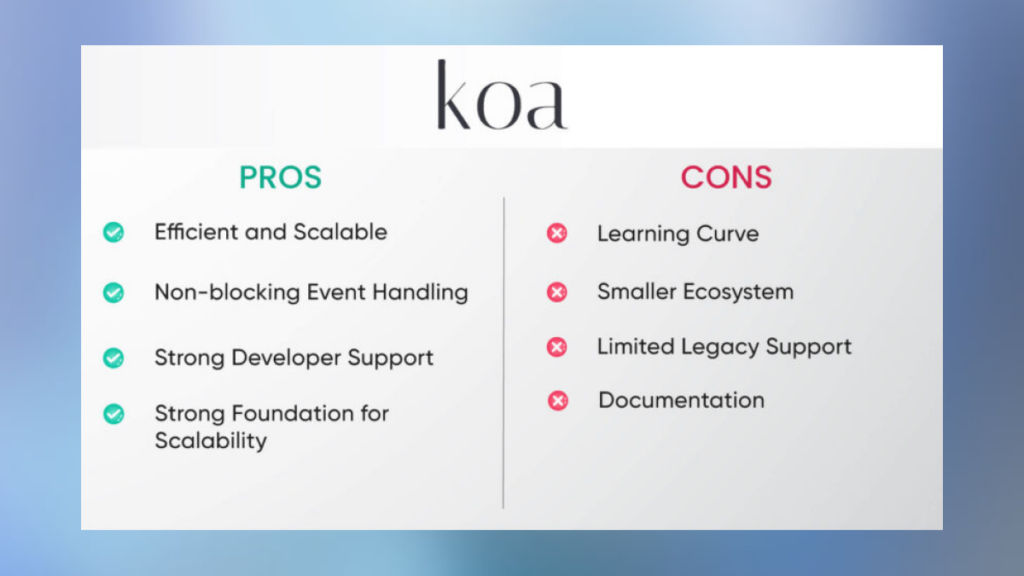
There’s a new Node.js framework called Koa.js that’s way better than Express.js. It handles requests super efficiently and has an event loop that never gets blocked.
Koa gets rid of callbacks and speeds up server creation by using async functions. Plus, Koa guarantees a good time with its not having middleware.
Pros of Koa.js:
- Koa is way better than Express because it has more efficient, scalable and can handle bigger projects.
- Koa keeps things running smoothly by handling event loops without any interruptions. It helps improve app speed by making sure each task is completed before moving on to the next one, which is a really important feature.
- Lots of software Developers are really into Koa, so it’s got a ton of support.
Cons of Koa.js:
- Express.js needs good documentation, but Koa could use some more and additional documentation requires. However, Koa has a strong community backing it up.
- Learning is best for every one but if you are new to NodeJS frameworks, Trying to learn them is not a good idea.
Sails.js
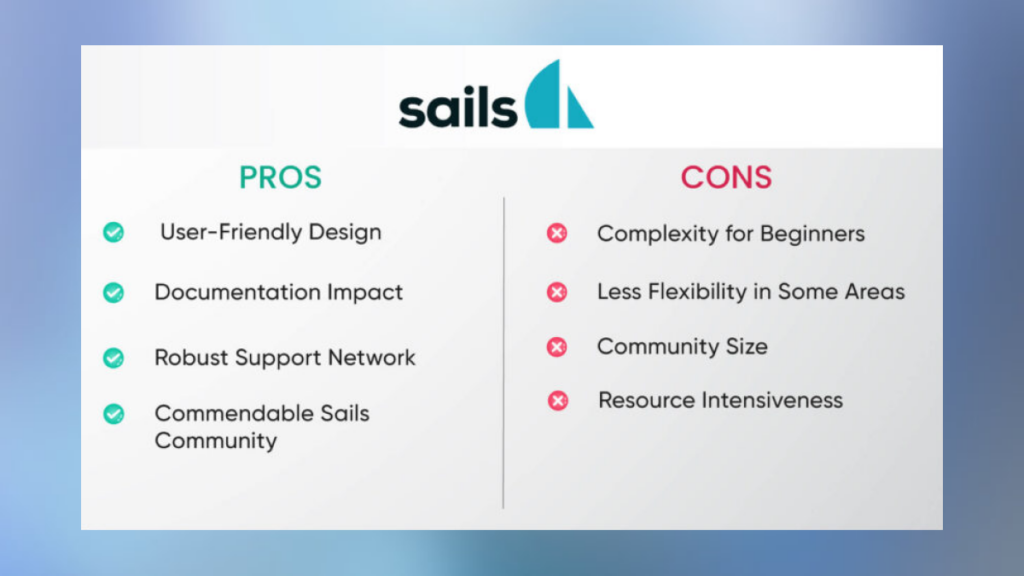
Sails.js, also known as Sails, is a cool Node.js framework that was made to work within the Node.js ecosystem. It’s free to use and open source under the MIT License, so go ahead and have fun with it!
This tool lets you make fancy Node.js web apps and APIs that are customized just for you. Sails is great because it works well with Node.js, making it easier for developers. It’s like Ruby on Rails, but for Node.js.
Pros of Sails.js:
- Our MVC framework is super user-friendly and a breeze to navigate.
- If you read the documentation carefully, using it will be easy. Just follow the guide to fix any issues that come up.
- The Sails community gives developers some really helpful documentation.
- The great network in this field helps developers solve any problem they come across, so it’s a solid choice overall.
Cons of Sails.js:
- This framework has way more cool stuff than the others. The sails need some special stuff to make them work even better.
- Beginners should steer clear of trying to learn this framework because it’s really tough.
Nest.js
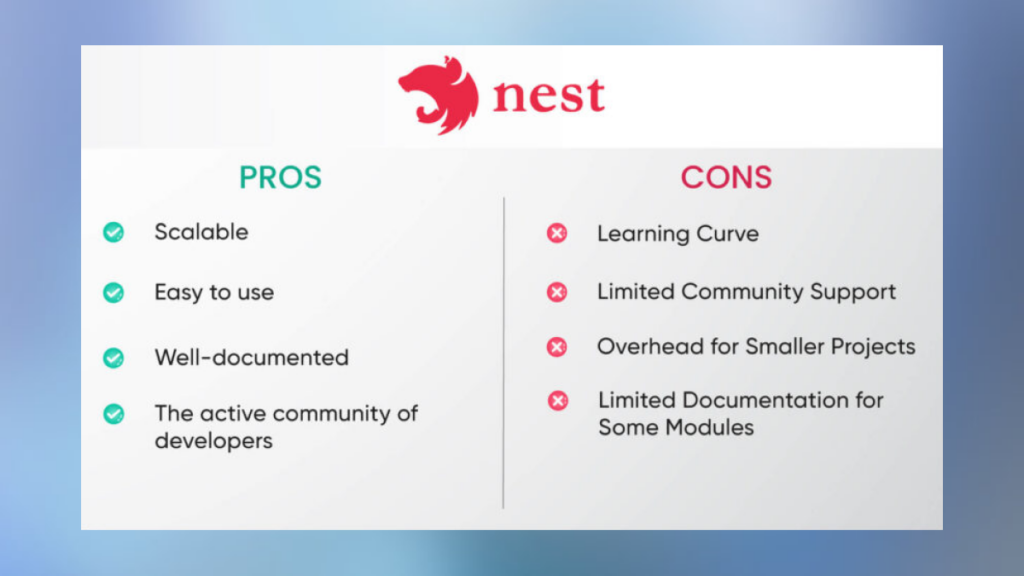
Nest.JS is a efficient and scalable framework for building Node.js servers that’s efficient and can handle a lot of traffic. It uses TypeScript, but don’t worry, you can still write your code in regular JavaScript if you want. With Nest.js, you can do all sorts of programming like object-oriented, functional, and reactive programming.
Nest.js can work with both Express and Fast as HTTP server platforms. It uses Express and Fast frameworks to expose APIs, making it easier to work with. This means you can use third-party modules in Nest.js. Nest.js apps are built with TypeScript, which helps catch errors during compile time. When building microservices, Nest.js helps developers avoid mistakes like sending duplicate responses.
Pros of Nest.js:
- Scalable
- Easy to use
- Well-documented
- The active community of developers
Cons of Nest.js:
- Other frameworks might be more well-known than this one.
- Learning can be tough for beginners.
Socket.io

Developers use Socket.IO, a JavaScript library, to develop real-time web apps. This technology lets you chat back and forth instantly. The client-side part works in browsers, while the server-side part works with node.js. They both have the same APIs.
Pros of Socket.io:
- It helps with multiplexing by using namespaces. When you use namespaces, you can reduce the amount of TCP connections needed and open up socket ports on the server.
- It lets the server send messages to all connected clients in a flexible way. You can also choose to only send messages to certain clients using different rooms.
Cons of Socket.io:
- Socket makes sure messages are sent exactly once. By default, it guarantees that a message will be sent at most once. You can configure it to guarantee at least one message. Dealing with this new challenge will involve estimating, setting timeouts, identifying messages clearly, and recording events in the database.
- Socket.IO doesn’t have a lot of built-in security stuff. It also doesn’t have token generation and renewal, which is another thing it’s missing.
Choosing the Right Node.Js Framework for Your Project
Node.js frameworks are super important for making web apps and services in JavaScript. They’re like your best friend when it comes to keeping things simple, fast, and easy to scale. Plus, they make sure everything stays consistent and easy to maintain.
- Express.js: Express.js is a framework for developing a websites and web services and web app. It’s user-friendly and built for speed.
- Meteor.js: Developers think Meteor is like the ultimate tool for building websites because it can do everything. They use it to create sites that can update in real-time, like chat apps.
- Koa.js: Koa.js is a lightweight and modern framework that’s made by the same similarly Express.js. It’s got lots of handy features and is super important for building websites and apps.
- Sails.js: lets you do full-stack web development. It uses the MVC pattern, which makes it easier for developers to handle everything. It has a bunch of cool features like ORM, authentication, and more, so you can do a lot with it.
- Nest.js: Nest.js hooks you up with type compatibility using TypeScript, just like the other Node.js frameworks out there. It’s all about creating slick, organized websites on a large scale. And the best part? This framework can handle multiple users simultaneously. Plus, developers can make changes without causing messy.
Frequently Asked Questions
1. Which Node.js framework is best?
It all comes down to what Node.js framework will be the best fit for your project based on things like how big it is, what features you need, and your team is expertise.
We need to use Express JS for a little project with a bunch of inexperienced folks. Node.js is the way to go because it’s super flexible, can handle a lot of traffic, and is really efficient for building lightweight web apps. Plus, the MVC models are quick, strong, and can be adapted to fit our needs.
We need to use Express JS for a little project with a bunch of inexperienced folks. Node.js is the way to go because it’s super flexible, can handle a lot of traffic, and is really efficient for building lightweight web apps. Plus, the MVC models are quick, strong, and can be adapted to fit our needs.
2. Which are the best Node.js frameworks?
- Express.js
- Nest.js
- Meteor.js
- Koa.js
3. Which is the most popular and famous Node.js framework?
Express.js is awesome and super popular among Node.js frameworks. It’s lightweight but packs a punch, making web app development a breeze. The documentation is top-notch and there’s a huge community of developers to help out. With Express, setting up servers and routes is a piece of cake. You can easily design multiple web apps using templates and do Dynamic Rendering with HTML pages. Thanks to its fast input/output operations, single-threaded nature, MVC architecture, and extensive library, handling routing is a walk in the park. It’s tough as nails!
4. Is Node.js a Framework?
Node.js is a platform where you can run JavaScript code without any limits. It’s open-source, so anyone can use it. Just remember, NodeJS isn’t a framework or a programming language. It might be a bit tricky to understand at first, but once you get the hang of it, you can do some pretty cool stuff. Lots of developers use Node.js to build backend systems for things like Web Apps and Mobile Apps. Big companies like PayPal, Uber, Netflix, Walmart, and LinkedIn all use Node.js for their production. It’s pretty popular in the tech world!
Also Read: Decoding The Future 2024: Which Developer Stack Will Dominate MEAN Or MERN ?
